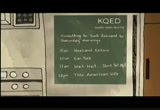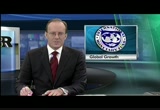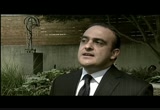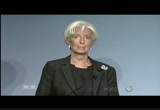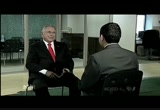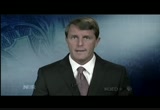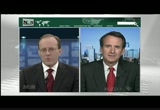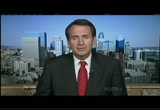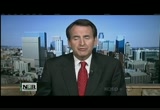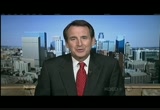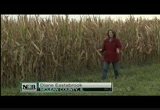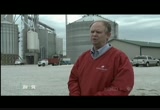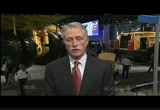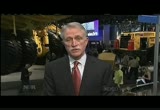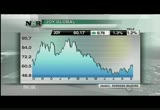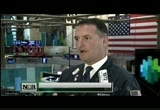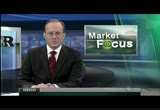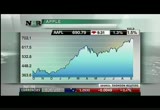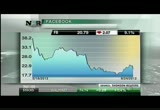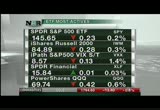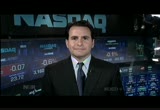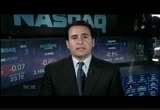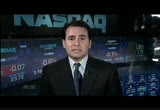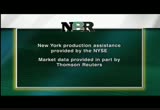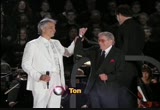tv Nightly Business Report PBS September 24, 2012 6:30pm-7:00pm PDT
6:30 pm
>> this is n.b.r. >> tom: good evening, i'm tom hudson. susie has the night off. calls for a sustained global economic rebound, not a bounce, as world economies slow. from higher minimum balances, to rising fees for a.t.m.'s and overdrafts, a new survey shows free checking is anything but. and apple sells five million iphone 5's over the weekend, but some expected more. that and more tonight on "n.b.r."! >> tom: u.s. investors began the week focused again on the global economy. the latest sign of worry:
6:31 pm
business confidence fell in germany for a fifth straight month in september. the international monetary fund today called on the international community to help finance the bailouts of euro- zone countries. that had u.s. markets following global markets lower. the dow fell 20 points, the nasdaq lost 19 and the s&p was down three. those worries in europe, are part of the reason the international monetary fund is shaving it's outlook for the global economy. the i.m.f.'s managing director says the trend has been clearly heading down. and, as darren gersh reports, she is calling on leaders in europe and the u.s. to change direction. >> reporter: the managing director of the i.m.f. has been described as the world's chief financial fire fighter. and today, christine lagarde urged policy makers in europe to make sure another spark doesn't re-ignite the crisis. >> we need a sustained rebound, a sustained rebound, not a bounce. if this time is to be different we need certainty more than uncertainty.
6:32 pm
and we need decision makers to turn into action takers. >> reporter: again and again, european leaders have shown they follow dramatic breakthroughs by enacting them slowly or not at all. the latest example is a plan to create a european banking union. over the weekend, e.u. leaders clashed over how fast they should move to put reforms in place. >> it shows a little bit the contradiction of the european project. in many aspects and certainly financially and economically, it is one nation, it's one economy, and yet, politically when it comes to sovereign decision- making it is 17 sovereign nations coming together with all what that means. >> reporter: the european central bank is the exception. earlier this month, it announced an open-ended program to buy bonds which has reassured markets that the central bank will not let debt-heavy countries like spain drag down the euro. analysts say that has aldo bought european leaders time to shore up the financial system.
6:33 pm
>> expecting europe to put together a fully comprehensive banking union in less time than we have spent to implement dodd- frank, i don't think that is necessarily realistic. but again, the key thing is that the political will is there. >> reporter: lagarde also questioned whether the u.s. has the political will to avoid the fiscal cliff. unless an agreement is reached, tax increases and spending cuts will take effect after new years sending the economy into reverse. >> and it's not a threat just for the united states of america. it's a threat for the global economy given the size of the u.s. economy and it's linkages with many other countries around the globe. >> reporter: if the u.s. slows, there may not be anyone left to pick up the slack. even china looks like its growth is faltering. darren gersh, "n.b.r.," washington. >> reporter: i'm diane eastabrook in central illinois. still ahead, the harvest is under way, and farmers are figuring out just how much damage the drought did to their
6:34 pm
crops. >> tom: that free checking account may not be so free. new regulations are squeezing bank profits, sending banks, both big and small, looking for new ways to bring in revenue. one way is by doing away with the free checking account which was so popular in the late 90's. ruben ramirez reports. >> reporter: dick evans is the c.e.o. of cullen/frost bankers. frost has 115 branches around texas. he says checking account fees are going up because of increased government regulation that went into effect a year ago. frost started looking for ways to simplify fees five years ago. its basic account carries a $5 monthly fee. but like many banks, if the account balance is above a certain level, the fee is waived. >> we have found that this account that i just described to you is excellence at a fair price. we give the quality service and it's a fair price and we have found that our customers embrace it. >> reporter: evans puts the cost of new bank regulation on the
6:35 pm
industry at $13 billion, a cost that's being passed on to consumers. according to a new survey by bankrate, the percentage of free checking accounts offered by banks continues to drop, only 39% of non-interest checking accounts are available to all customers free of charge, that's down nearly 50% in the past three years. other banking fees are also on the rise: >> we continue to see pretty steady increases in the old standbys. things like atm fees and overdraft charges but even with regard to checking accounts. not only are more accounts charging fees now because of the decline in free checking but the fees and the balances required to avoid those fees have hit record highs. >> reporter: the industry has largely returned to solid footing after the financial crisis. u.s. banks earned $34.5 billion in the second quarter, representing a 21% increase over year-earlier levels. almost three in four americans say they would switch banks if their checking account fees increased, the worrisome part for the banking industry is that a big percentage of those people
6:36 pm
who said they would switch were in the high-income segment, it's the group that tends to be the most profitable for banks. ruben ramirez, "n.b.r.," new york. >> tom: tim pawlenty is the former governor of minnesota, the incoming c.e.o. of the financial services round table, that is a financial industries lobbying group based in washington. the governor joins us from the twin cities in minnesota, congrats on the new position, governor. this bank rate sur i have find higher minimum balances, overdraft fees an surcharges over the paths four years. as you move into this position, do you sense baking fees are appropriately regulated currently? >> well, when it comes to regulation, of course, financial institutions, i want regulations to be clear and firm, but fair. and one thing that's not fair is price controls imposed by government. i think history shows the best way to have price goes down is to have competition and lots of consumer choice. and to have government step in and insert and exert
6:37 pm
price controls never works and it won't work here either. >> tom: over the past year the financial industry, well really over the past four year, let's be honest, the financial industry's reputation has been dinged. but the financial trust index has found a percentage of americans trusting banks has been falling steadily. fewer than a third trust banks it in the latest survey, this summer. how does the industry and you specifically begin to address this? >> well, the financial system went through a shock, really, and avalanche of problems as we all know beginning in 2008 and following. and the fallout from that revealed that we had financial institutions and more specifically individuals within financial institutions. and people throughout the financial system, you know, doing things that turned out to be not very wise. and so now there has been a series of reforms. and you don't just get trust, you earn trust. and so i think you've seen the banks in the financial institutions more broadly. improving their reputation. but it's-- there is much more work yet to be done. there's no question about that, tom. but it is improving and i'm
6:38 pm
going to continue to make sure it improves in this role. >> tom: i want to ask you about specific regulation, the volker rule being one identify by critics of the banking industry that could help improve the reputation and trust that americans have, which would essentially separate banking from banks trading with the banks own money. is the volker rule something you support? >> well, i think we can all agree that banks and financial institutions shouldn't use depositor money to engage in speculation, irresponsible speculation. but we want the rules of the road to be clear and we want what speculation is to be clearly defined. and even paul volker has said the volker rule as it has turned out has been vague and isn't what he had intended. >> tom: i want to ask you about something you said while you were running for the gop nomination for president. you said that wall street, about wall street, quote, get your snout out of the trough. no more bailout, handouts, carveouts or special deals. is that a message you carry with you to the industry now? >> well, actually, they carried it to themselves.
6:39 pm
because as you know, tom, the laws that exist now is if there needs to be a winddown of a large financial institution, that's going to be paid for in part by an assessment on the industry itself. so if we have to winddown a large financial institution in the future, it's akin to, not exactly an orderly bankruptcy process, but it's akin to that. and to the extent there needs to be some last settle up there, it is an assessment based on the industry's payments into a fund fund. and so that concern and vision that i expressed and maybe that inart willful way to say it has actually come to be true. >> tom: the former governor of minnesota, tim pawlenty, the incoming c.e.o. of the financial services round table.
6:40 pm
>> tom: autumn officially is only a few days old, but u.s. farmers already have harvested almost half of this year's corn crop. the drought scotched hopes for a bumper crop this year, but some farmers in parts of illinois and iowa say the harvest isn't as bad a feared. diane eastabrook has details. >> reporter: as the blades of a combine slice though his corn crop, carl neubauer looks over fields he feared wouldn't produce anything this year. >> we estimate that we'll probably be between 80 and 100 bushels and we think our average will be in the 100 to 105 bushel per acre. >> reporter: in a normal year this central illinois farm produces twice that amount. but then again this hasn't been a normal year. when we visited neubauer's farm in june, the drought was just starting. his fertile soil was cracking from lack of rain and corn stalks were withering from the heat. neubaurer thinks technology saved him.
6:41 pm
>> i think we just found that our hybrids the new genetics that we're planting they were better able to withstand the stress better than we thought. >> reporter: while this isn't going to be the bountiful year u.s. farmers predicted last spring, it might not be a total bust. earlier this month the usda estimated farmers will harvest on average about 123 bushels of corn per acre this fall; that's a 13% decline from last year. >> the government bases those estimates on samples it takes and surveys it does with farmers, but experts say this year weather conditions and crop conditions varied so much from one farm to the next it's hard to say what yields will be. >> reporter: ag economist bill tierney thinks this corn crop could make the history books. >> there was something that meteorologists like to call pop- up thunderstorms and if you got an inch-and-a-half rainfall from a thunderstorm in your area at just the right time you could have a yield that is anywhere
6:42 pm
from 30%, to 40%, to 50% better than a neighbor that is just a couple of miles down the road. >> reporter: the yuton grain elevator is seeing that. it's buying corn from farmers within a ten mile radius of the facility whose yields are running anywhere from ten bushels to 200 bushels per acre. still manager steve dennis expects his business will take a hit this year. >> we're not drying near as much, there's not as much merchandising opportunity. everything that we do to make money is about half what it would be in a normal year. >> reporter: at this point it's hard to say what the final tally will be. the government won't determine how much farmers like neubaurer produced this year until after the first of next year. diane eastabrook, "n.b.r.," mclean county, illinois. >> tom: a warning late today from caterpillar, the company sees the global economy limping along for a couple pore years so the maker of construction, mining and agriculture equipment cut its 2015
6:43 pm
financial outlook late today pointing to the sluggish economy around the world. michael sutherlin certainly knows a thing or two, he competes against caterpillar as the c.e.o. of mining equipment manufacturing joy global. he joins us from the expo international in las vegas. mr. sutherlin, any update on your financial outlook? >> well, i think in our third-quarter earnings release we have indicated that we expect the markets to go sideway force awhile. we expect the markets to stabilize and we believe that we're sort of at a bottom condition. we think we will stay there for a few quarters. and as a result we had indicated that we expect our 2013 to be flat-to-down slightly from our 2012. and we indicated that at the end of our third quarter. and we till believe that that is a good outlook for our business right now. >> in fact at that time you said you didn't see any catalyst for equipment demand until there was strength in commodity demand. when you are forecasting the
6:44 pm
return to that commodity demand? >> well, we do have upsides in the commodities in our major markets. so if you take the u.s. market, for example, we have had a fairly significant correction to weaker electricity demand but more importantly to low natural-gas prices. but we saw switching back to coal in june and july as gas prices moved above 2.50. gave us a real confidence that the models that we have that indicate that switching is economic between gas and coal do work. we will see more switching to coal as gas prices continue to migrate up to replacement costs. >> we have most of the excess capacity in the u.s. fleet is in coal fired units which gives us some near-term upside but in the long term the upside is really going to be driven by exports and our customers are doubling the capacity and the export market, capacity to export out into the international market. >> mike where are your best opportunities overseas. talk to us about china. >> china has been slowing an
6:45 pm
we've seen that slowing in the power generation rates. so we see electricity demand, running at about half the growth rate we saw in the previous couple of years. that slowing has left china with surplus of mine cag passity for coal. but at the same time we saw imports continue to move into china which clearly to us indicates that china has become a high cost producer and imports have a competitive advantage. >> tom: just a half minute left but again to this outlook, shares of joy global tonight around $60. in february they were $90 plus. what's the difference with the outlook today versus what it was in the first quarter of the calendar year? >> well, i think that there's a misunderstanding of how important the after market is to our business. we generate 60% of our revenues out of our after-market sales, after-market service and support. at's a tremendous stabilizer to our business. and has allowed us in 200 its to level revenues and increase earnings during
6:46 pm
that economic recession during 2009. so i think that we get overreaction when the commodity markets begin to peak. and i think our business demonstrates its ability to maneuver through that wots excessive downside people are expecting. >> looking at that after-market for parts and services after you sell those big piece of equipment. mike sutherland, c.e.o. of joy global. >> tom: tomorrow we continue our coverage from mine-expo, we'll talk coal demand with greg boyce, chairman and c.e.o. at peabody energy. >> tom: the presidential
6:47 pm
election is only 43 days away. traders and investors are watching the race closely because the outcome will help determine the direction of the economy and financial markets. all this week well be talking to traders in the trenches to get their views on how politics influence the markets. today, erika miller spoke with jonathan corpina, a trader at the new york stock exchange. >> to the presidential election is only about six weeks away. how are traders in general viewing the election? >> it's a very interesting time right now. and if you look at our current election and the process, it's a tight race. every week the numbers cope changing. but not by that much where there is an outright expected winner at this point right now. so the uncertainty of how this election is going to pan out is somewhat helping this market. i think it's keeping more people in this market. >> reporter: you were on the floor four years ago. how does the mood today compare to back then. >> you know, the mood, i think, is a little bit different. the times are different, times have changed now. i think now it's more of there is that light at the end of the tunnel who is
6:48 pm
going to get us down there. back then i think we were still just digging out of the holes that everybody was in. >> what do you think is factored into the market right now, an obama victory or a romney victory? >> i think it is either president is going get elected i think the market will react the same way. i think the market will still move higher because what we have seen is the economic data that has been coming out of washington has supported this rally that we've seen. job numbers are getting better. housing numbers are getting better. not at the speed in which everybody would like to see it but yes, things are getting better. >> even after the election we still have the overhang of the fiscal cliff. how are traders viewing that threat. >> that's scary it is a date on the calendar that keeps getting pushed but we know is out there and something like that is going to come. but as time gets pushed out there are some really big dark clouds that are there and i think investors will have to figure out who they think is going to be best to get us through there. do you take the-- incumbent president who has been sitting there and part of these issues and part of the solutions that are there, or
6:49 pm
dow take the wall street type of guy who might be able to come through and face some of these economic issues that are there. >> reporter: which is the greater overhang for the market now. politics or economics? >> i think today it's politics. i think economics will come back to the forefront in another two months. once we get a better zrnlted as to how this election is an out. i think then we come back to the basics and look back at the economic issues that we have. >> jonathan, thank you veryha >> tom: as european worries were >> tom: as european worries were back in the headlines, u.s. stock indices were under pressure. the s&p 500's lowest price of the day came just after the opening bell. a mid-afternoon recovery didn't have the legs to last with the index finishing down a fraction. volume was 624 million shares on the big board. 1.7 billion on the nasdaq.
6:50 pm
the technology sector has the biggest drop, down 0.8%. the energy and materials sectors fell 0.5% each. no question apple has a hit with its iphone five released on friday. it couldn't keep up with demand over the weekend. apple sold over five million iphone 5's, a first-weekend sales record for the devices. but some analysts expected sales of eight million. shares of apple saw some selling pressure, falling 1.3%, but they're coming off a new high hit last week in anticipation of the new device. by the way, the sales figure from apple does not include pre- ordered iphones. while there's been plenty of talk about apple's newest iphone, one of its biggest competitors, google, saw its shares hit a record high. shares were up 2.1%, closing just shy of $750. it's up more than 25% since mid- july. meantime, another technology giant, intel, has seen its share price shrink.
6:51 pm
the stock fell 1.4% today, ending at a ten month low. the company has been hit by the p.c. customers delaying orders, in favor of tablets, or waiting for the newest microsoft window's operating system later this year. speaking of that new microsoft product, morgan stanley is worried about software firm citrix systems. the investment bank cut its rating and price target, sending shares lower. citrix was the biggest loser among s&p 500 technology shares, down 5.2%. this is citrix's lowest price since late august. facebook shares actively trade big volume dropping 9.1%. financial weekly newspaper barrons over the weekend questioned the stock evaluation giving facebook a price target of $15. closed tonight above that. as we mentioned earlier, caterpillar echoed he worries about the global economy late today when it cut its financial outlook. after closing down 0.9%, shares of cat fell another 2% after the closing bell.
6:52 pm
it traded around $89 per share in extended trading. but some good news about home construction from home builder lennar. it's the third largest home builder in the u.s., and orders are on the up-swing. before one-time items, earnings per share were lower than anticipated. but its revenues were the highest in almost four years. lennar is the just latest builder to show an improving business. however, the stock fell 1.5% after hitting a post-recession high earlier in the session. four of the five most actively traded exchange traded products were down. the lone winner was the financial sector e.t.f., squeezing out a one penny per share gain. and that's tonight's "market focus."
6:53 pm
>> tom: about 2,000 workers in a huge brawl shut down a chinese electronics manufacturing plant early today. the plant is owned by fox-conn, one of the world's biggest contract manufacturers, making devices such as apple's iphone. the unrest began at a company employee dormitory, but there are accusations it was sparked by factory guards. this is the latest incident at chinese companies u.s. firms rely on to make their products. tonight's word on the street: exposure. gregg greenberg is a reporter with the street.com. gregg what u.s. companies are exposed to these kinds of chinese manufacturers? >> well, apple may be the biggest and best known but it's certainly not alone. hp, dell, samsung, sony, all of these employ services to make their products. >> tom: losses of electronic manufacturers that you list there we've seen these labor issues flare up, certainly over the past several months, working conditions, working
6:54 pm
hours, pay. what is the expose through-- exposure that these u.s. companies have there? >> well, it's tremendous,-- bo boxcondoes a lot of business with powerhouse f people want iphone cheap they have to use foxcon. the thing is that apple c.e.o. tim cook said he would like to have more manufacturing in the united states. but it's just not feasible. and it's not just because of cost either. they have a lot of flexibility there, and so if they need to add or subtract a shift or need to add a component, they don't have to check with the unions or epa, they just do it. >> tom: so that leads to the question how captive are companies like apple to these chinese manufacturers? >> they're tremendously captive. we can make more component parts. and are you seeing that in the united states. apple is increasing the orders from companies like texas instruments and qualcomm and broadcom. and we've seen these components in the new iphones. but if wants to move away manufacturing it's not as easy because once again it's a low-cost provider, and it
6:55 pm
gives them the flexibility to make more at a moment's notice. >> tom: seemingly this would be extremely important to the business models for these companies, not just-in-time manufacturing but in order to maintain those profit margins that investors want to see, right? >> investors want to see profit margins. and users want their i foens as soon as possible. you see the lines happening in apple stores. americans want their iphones, they want them now and cheap. that is to the going lap without foxcom. than is causing alots of labor unrest in china right now. >> tom: we certainly saw that overnight in china. word on the street, gregg greenberg is with thestreet.com. >> tom: tomorrow on "n.b.r." we'll get the latest reading on consumer confidence, and an update on home prices, we'll see if those year-over-year price gains can continue. and we talk banking reform with sheila bair, the former head of the f.d.i.c.
6:56 pm
that's "nightly business report" for monday, september 24. good night everyone. i'm tom hudson, we'll see you online at: www.nbr.com and right back here tomorrow night. captioning sponsored by wpbt captioned by media access group at wgbh access.wgbh.org >> join us anytime at nbr.com. there, you'll find full episodes of the program, complete show transcripts and all the market stats. also follows us on our facebook page at bizrpt. and on twitter @bizrpt.
373 Views
Uploaded by TV Archive on

 Live Music Archive
Live Music Archive Librivox Free Audio
Librivox Free Audio Metropolitan Museum
Metropolitan Museum Cleveland Museum of Art
Cleveland Museum of Art Internet Arcade
Internet Arcade Console Living Room
Console Living Room Books to Borrow
Books to Borrow Open Library
Open Library TV News
TV News Understanding 9/11
Understanding 9/11